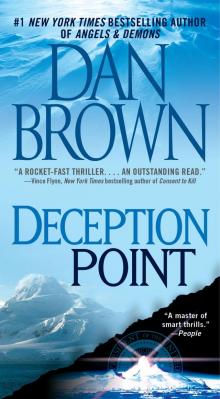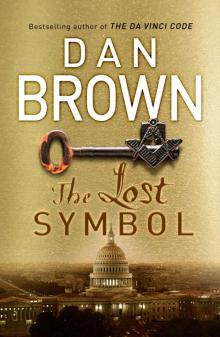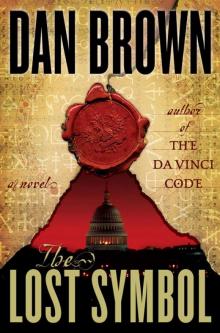The Da Vinci Code Read online
Page 5
quietly gnawing at the hand that fed him. He incorporated in many of his Christian paintings hidden symbolism that was anything but Christian – tributes to his own beliefs and a subtle thumbing of his nose at the Church. Langdon had even given a lecture once at the National Gallery in London entitled:» The Secret Life of Leonardo: Pagan Symbolism in Christian Art.»
«I understand your concerns,» Langdon now said, «but Da Vinci never really practiced any dark arts. He was an exceptionally spiritual man, albeit one in constant conflict with the Church.» As Langdon said this, an odd thought popped into his mind. He glanced down at the message on the floor again. O, Draconian devil! Oh, lame saint!
«Yes?» Fache said.
Langdon weighed his words carefully. «I was just thinking that Saunière shared a lot of spiritual ideologies with Da Vinci, including a concern over the Church’s elimination of the sacred feminine from modern religion. Maybe, by imitating a famous Da Vinci drawing, Saunière was simply echoing some of their shared frustrations with the modern Church’s demonization of the goddess.»
Fache’s eyes hardened. «You think Saunière is calling the Church a lame saint and a Draconian devil?»
Langdon had to admit it seemed far-fetched, and yet the pentacle seemed to endorse the idea on some level. «All I am saying is that Mr. Saunière dedicated his life to studying the history of the goddess, and nothing has done more to erase that history than the Catholic Church. It seems reasonable that Saunière might have chosen to express his disappointment in his final good-bye.»
«Disappointment?» Fache demanded, sounding hostile now. «This message sounds more enragedthan disappointed, wouldn’t you say?»
Langdon was reaching the end of his patience. «Captain, you asked for my instincts as to what Saunière is trying to say here, and that’s what I’m giving you.»
«That this is an indictment of the Church?» Fache’s jaw tightened as he spoke through clenched teeth. «Mr. Langdon, I have seen a lot of death in my work, and let me tell you something. When a man is murdered by another man, I do not believe his final thoughts are to write an obscure spiritual statement that no one will understand. I believe he is thinking of one thing only.» Fache’s whispery voice sliced the air. «La vengeance.I believe Saunière wrote this note to tell us who killed him.» Langdon stared. «But that makes no sense whatsoever.» «No?» «No,» he fired back, tired and frustrated. «You told me Saunière was attacked in his office by someone he had apparently invited in.»
«Yes.»
«So it seems reasonable to conclude that the curator knew his attacker.» Fache nodded. «Go on.» «So if Saunière knew the person who killed him, what kind of indictment is this?» He pointed at the floor. «Numeric codes? Lame saints? Draconian devils? Pentacles on his stomach? It’s all too cryptic.»
Fache frowned as if the idea had never occurred to him. «You have a point.»
«Considering the circumstances,» Langdon said,» I would assume that if Saunière wanted to tell you who killed him, he would have written down somebody’s name.»
As Langdon spoke those words, a smug smile crossed Fache’s lips for the first time all night. «Précisément,»Fache said. «Précisément.»
I am witnessing the work of a master , mused Lieutenant Collet as he tweaked his audio gear and listened to Fache’s voice coming through the headphones. The agent supérieur knew it was moments like these that had lifted the captain to the pinnacle of French law enforcement.
Fache will do what no one else dares.
The delicate art of cajoler was a lost skill in modern law enforcement, one that required exceptional poise under pressure. Few men possessed the necessary sangfroid for this kind of operation, but Fache seemed born for it. His restraint and patience bordered on the robotic.
Fache’s sole emotion this evening seemed to be one of intense resolve, as if this arrest were somehow personal to him. Fache’s briefing of his agents an hour ago had been unusually succinct and assured. I know who murdered Jacques Saunière, Fache had said. You know what to do.No mistakes tonight.
And so far, no mistakes had been made.
Collet was not yet privy to the evidence that had cemented Fache’s certainty of their suspect’s guilt, but he knew better than to question the instincts of the Bull. Fache’s intuition seemed almost supernatural at times. God whispers in his ear, one agent had insisted after a particularly impressive display of Fache’s sixth sense. Collet had to admit, if there was a God, Bezu Fache would be on His A-list. The captain attended mass and confession with zealous regularity – far more than the requisite holiday attendance fulfilled by other officials in the name of good public relations. When the Pope visited Paris a few years back, Fache had used all his muscle to obtain the honor of an audience. A photo of Fache with the Pope now hung in his office. The Papal Bull, the agents secretly called it.
Collet found it ironic that one of Fache’s rare popular public stances in recent years had been his outspoken reaction to the Catholic pedophilia scandal. These priests should be hanged twice! Fache had declared. Once for their crimes against children.And once for shaming the good name of theCatholic Church.Collet had the odd sense it was the latter that angered Fache more.
Turning now to his laptop computer, Collet attended to the other half of his responsibilities here tonight – the GPS tracking system. The image onscreen revealed a detailed floor plan of the Denon Wing, a structural schematic uploaded from the Louvre Security Office. Letting his eyes trace the maze of galleries and hallways, Collet found what he was looking for. Deep in the heart of the Grand Gallery blinked a tiny red dot. La marque.
Fache was keeping his prey on a very tight leash tonight. Wisely so. Robert Langdon had proven himself one cool customer.
CHAPTER 9
To ensure his conversation with Mr. Langdon would not be interrupted, Bezu Fache had turned off his cellular phone. Unfortunately, it was an expensive model equipped with a two-way radio feature, which, contrary to his orders, was now being used by one of his agents to page him.
« Capitaine? » The phone crackled like a walkie-talkie.
Fache felt his teeth clench in rage. He could imagine nothing important enough that Collet would interrupt this surveillance cachée – especially at this critical juncture.
He gave Langdon a calm look of apology. «One moment please.» He pulled the phone from his belt and pressed the radio transmission button. «Oui?»
«Capitaine, un agent du Département de Cryptographie est arrivé.»
Fache’s anger stalled momentarily. A cryptographer? Despite the lousy timing, this was probably good news. Fache, after finding Saunière’s cryptic text on the floor, had uploaded photographs of the entire crime scene to the Cryptography Department in hopes someone there could tell him what the hell Saunière was trying to say. If a code breaker had now arrived, it most likely meant someone had decrypted Saunière’s message.
«I’m busy at the moment,» Fache radioed back, leaving no doubt in his tone that a line had been crossed. «Ask the cryptographer to wait at the command post. I’ll speak to him when I’m done.»
« Her , »the voice corrected. «It’s Agent Neveu.»
Fache was becoming less amused with this call every passing moment. Sophie Neveu was one of DCPJ’s biggest mistakes. A young Parisian déchiffreuse who had studied cryptography in England at the Royal Holloway, Sophie Neveu had been foisted on Fache two years ago as part of the ministry’s attempt to incorporate more women into the police force. The ministry’s ongoing foray into political correctness, Fache argued, was weakening the department. Women not only lacked the physicality necessary for police work, but their mere presence posed a dangerous distraction to the men in the field. As Fache had feared, Sophie Neveu was proving far more distracting than most.
At thirty-two years old, she had a dogged determination that bordered on obstinate. Her eager espousal of Britain’s new cryptologic methodology continually exasperated the veteran French cryptographers above her. And
by far the most troubling to Fache was the inescapable universal truth that in an office of middle-aged men, an attractive young woman always drew eyes away from the work at hand.
The man on the radio said,» Agent Neveu insisted on speaking to you immediately, Captain. I tried to stop her, but she’s on her way into the gallery.»
Fache recoiled in disbelief. «Unacceptable! I made it very clear – «
For a moment, Robert Langdon thought Bezu Fache was suffering a stroke. The captain was mid- sentence when his jaw stopped moving and his eyes bulged. His blistering gaze seemed fixated on something over Langdon’s shoulder. Before Langdon could turn to see what it was, he heard a woman’s voice chime out behind him.
«Excusez-moi, messieurs.»
Langdon turned to see a young woman approaching. She was moving down the corridor toward them with long, fluid strides… a haunting certainty to her gait. Dressed casually in a knee-length, cream-colored Irish sweater over black leggings, she was attractive and looked to be about thirty. Her thick burgundy hair fell unstyled to her shoulders, framing the warmth of her face. Unlike the waifish, cookie-cutter blondes that adorned Harvard dorm room walls, this woman was healthy with an unembellished beauty and genuineness that radiated a striking personal confidence.
To Langdon’s surprise, the woman walked directly up to him and extended a polite hand.» Monsieur Langdon, I am Agent Neveu from DCPJ’s Cryptology Department.» Her words curved richly around her muted Anglo-Franco accent. «It is a pleasure to meet you.»
Langdon took her soft palm in his and felt himself momentarily fixed in her strong gaze. Her eyes were olive-green – incisive and clear.
Fache drew a seething inhalation, clearly preparing to launch into a reprimand.
«Captain,» she said, turning quickly and beating him to the punch, «please excuse the interruption, but –»
«Ce n’est pas le moment!» Fache sputtered.
«I tried to phone you.» Sophie continued in English, as if out of courtesy to Langdon. «But your cell phone was turned off.»
«I turned it off for a reason,» Fache hissed. «I am speaking to Mr. Langdon.» «I’ve deciphered the numeric code,» she said flatly. Langdon felt a pulse of excitement. She broke the code?
Fache looked uncertain how to respond.
«Before I explain,» Sophie said,» I have an urgent message for Mr. Langdon.» Fache’s expression turned to one of deepening concern. «For Mr. Langdon?» She nodded, turning back to Langdon. «You need to contact the U. S. Embassy, Mr. Langdon. They have a message for you from the States.»
Langdon reacted with surprise, his excitement over the code giving way to a sudden ripple of concern. A message from the States? He tried to imagine who could be trying to reach him. Only a few of his colleagues knew he was in Paris.
Fache’s broad jaw had tightened with the news. «The U. S. Embassy?» he demanded, sounding suspicious. «How would they know to find Mr. Langdon here?»
Sophie shrugged. «Apparently they called Mr. Langdon’s hotel, and the concierge told them Mr. Langdon had been collected by a DCPJ agent.»
Fache looked troubled. «And the embassy contacted DCPJ Cryptography?»
«No, sir,» Sophie said, her voice firm. «When I called the DCPJ switchboard in an attempt to contact you, they had a message waiting for Mr. Langdon and asked me to pass it along if I got through to you.»
Fache’s brow furrowed in apparent confusion. He opened his mouth to speak, but Sophie had already turned back to Langdon.
«Mr. Langdon,» she declared, pulling a small slip of paper from her pocket,» this is the number for your embassy’s messaging service. They asked that you phone in as soon as possible.» She handed him the paper with an intent gaze. «While I explain the code to Captain Fache, you need to make this call.»
Langdon studied the slip. It had a Paris phone number and extension on it. «Thank you,» he said, feeling worried now. «Where do I find a phone?»
Sophie began to pull a cell phone from her sweater pocket, but Fache waved her off. He now looked like Mount Vesuvius about to erupt. Without taking his eyes off Sophie, he produced his own cell phone and held it out. «This line is secure, Mr. Langdon. You may use it.»
Langdon felt mystified by Fache’s anger with the young woman. Feeling uneasy, he accepted the captain’s phone. Fache immediately marched Sophie several steps away and began chastising her in hushed tones. Disliking the captain more and more, Langdon turned away from the odd confrontation and switched on the cell phone. Checking the slip of paper Sophie had given him, Langdon dialed the number.
The line began to ring.
One ring… two rings… three rings… Finally the call connected. Langdon expected to hear an embassy operator, but he found himself instead listening to an answering machine. Oddly, the voice on the tape was familiar. It was that of Sophie Neveu.
«Bonjour, vous êtes bien chez Sophie Neveu,» the woman’s voice said. «Je suis absenle pour le moment, mais…»
Confused, Langdon turned back toward Sophie. «I’m sorry, Ms. Neveu? I think you may have given me –»
«No, that’s the right number,» Sophie interjected quickly, as if anticipating Langdon’s confusion.» The embassy has an automated message system. You have to dial an access code to pick up your messages.»
Langdon stared. «But –»
«It’s the three-digit code on the paper I gave you.»
Langdon opened his mouth to explain the bizarre error, but Sophie flashed him a silencing glare that lasted only an instant. Her green eyes sent a crystal-clear message.
Don’t ask questions. Just do it.
Bewildered, Langdon punched in the extension on the slip of paper: 454.
Sophie’s outgoing message immediately cut off, and Langdon heard an electronic voice announce in French: «You have one new message.» Apparently, 454 was Sophie’s remote access code for picking up her messages while away from home.
I’m picking up this woman’s messages?
Langdon could hear the tape rewinding now. Finally, it stopped, and the machine engaged. Langdon listened as the message began to play. Again, the voice on the line was Sophie’s.
«Mr. Langdon,» the message began in a fearful whisper. «Do not react to this message. Just listen calmly. You are in danger right now. Follow my directions very closely.»
CHAPTER 10
Silas sat behind the wheel of the black Audi the Teacher had arranged for him and gazed out at the great Church of Saint-Sulpice. Lit from beneath by banks of floodlights, the church’s two bell towers rose like stalwart sentinels above the building’s long body. On either flank, a shadowy row of sleek buttresses jutted out like the ribs of a beautiful beast.
The heathens used a house of God to conceal their keystone.Again the brotherhood had confirmed their legendary reputation for illusion and deceit. Silas was looking forward to finding the keystone and giving it to the Teacher so they could recover what the brotherhood had long ago stolen from the faithful.
How powerful that will make Opus Dei.
Parking the Audi on the deserted Place Saint-Sulpice, Silas exhaled, telling himself to clear his mind for the task at hand. His broad back still ached from the corporal mortification he had endured earlier today, and yet the pain was inconsequential compared with the anguish of his life before Opus Dei had saved him.
Still, the memories haunted his soul.
Release your hatred, Silas commanded himself. Forgive those who trespassed against you.
Looking up at the stone towers of Saint-Sulpice, Silas fought that familiar undertow… that force that often dragged his mind back in time, locking him once again in the prison that had been his world as a young man. The memories of purgatory came as they always did, like a tempest to his senses… the reek of rotting cabbage, the stench of death, human urine and feces. The cries of hopelessness against the howling wind of the Pyrenees and the soft sobs of forgotten men.
Andorra , he thought, feeling his muscles tighten.
Incredibly, it was in that barren and forsaken suzerain between Spain and France, shivering in his stone cell, wanting only to die, that Silas had been saved.
He had not realized it at the time.
The light came long after the thunder.
His name was not Silas then, although he didn’t recall the name his parents had given him. He had left home when he was seven. His drunken father, a burly dockworker, enraged by the arrival of an albino son, beat his mother regularly, blaming her for the boy’s embarrassing condition. When the boy tried to defend her, he too was badly beaten.
One night, there was a horrific fight, and his mother never got up. The boy stood over his lifeless mother and felt an unbearable up-welling of guilt for permitting it to happen.
This is my fault!
As if some kind of demon were controlling his body, the boy walked to the kitchen and grasped a butcher knife. Hypnotically, he moved to the bedroom where his father lay on the bed in a drunken stupor. Without a word, the boy stabbed him in the back. His father cried out in pain and tried to roll over, but his son stabbed him again, over and over until the apartment fell quiet.
The boy fled home but found the streets of Marseilles equally unfriendly. His strange appearance made him an outcast among the other young runaways, and he was forced to live alone in the basement of a dilapidated factory, eating stolen fruit and raw fish from the dock. His only companions were tattered magazines he found in the trash, and he taught himself to read them. Over time, he grew strong. When he was twelve, another drifter – a girl twice his age – mocked him on the streets and attempted to steal his food. The girl found herself pummeled to within inches of her life. When the authorities pulled the boy off her, they gave him an ultimatum – leave Marseilles or go to juvenile prison.
The boy moved down the coast to Toulon. Over time, the looks of pity on the streets turned to looks of fear. The boy had grown to a powerful young man. When people passed by, he could hear them whispering to one another. A ghost, they would say, their eyes wide with fright as they stared at his white skin. A ghost with the eyes of a devil!
And he felt like a ghost… transparent… floating from seaport to seaport. People seemed to look right through him. At eighteen, in a port town, while attempting to steal a case of cured ham from a cargo ship, he was caught by a pair of crewmen. The two sailors who began to beat him smelled of beer, just as his father had. The memories of fear and hatred surfaced like a monster from the deep. The young man broke the first sailor’s neck with his bare hands, and only the arrival of the police saved the second sailor from a similar fate.
Two months later, in shackles, he arrived at a prison in Andorra.
You are as white as a ghost , the inmates ridiculed as the guards marched him in, naked and cold.
Mira el espectro! Perhaps the ghost will pass right through these walls!
Over the course of twelve years, his flesh and soul withered until he knew he had become transparent.
I am a ghost.
I am weightless.
Yo soy un espectro … palido coma una fantasma … caminando este mundo a solas.
One night the ghost awoke to the screams of other inmates. He didn’t know what invisible force was shaking the floor on which he slept, nor what mighty hand was trembling the mortar of his stone cell, but as he jumped to his feet, a large boulder toppled onto the very spot where he had been sleeping. Looking up to see where the stone had come from, he saw a hole in the trembling wall, and beyond it, a vision he had not seen in over ten years. The moon.
Even while the earth still shook, the ghost found himself scrambling through a narrow tunnel, staggering out into an expansive vista, and tumbling down a barren mountainside into the woods. He ran all night, always downward, delirious with hunger and exhaustion.
Skirting the edges of consciousness, he found himself at dawn in a clearing where train tracks cut a swath across the forest. Following the rails, he moved on as if dreaming. Seeing an empty freight car, he crawled in for shelter and rest. When he awoke the train was moving. How long? How far?A pain was growing in his gut. Am I dying? He slept again. This time he awoke to someone yelling, beating him, throwing him out of the freight car. Bloody, he wandered the outskirts of a small village looking in vain for food. Finally, his body too weak to take another step, he lay down by the side of the road and slipped into unconsciousness.
The light came slowly, and the ghost wondered how long he had been dead. A day? Three days? It didn’t matter. His bed was soft like a cloud, and the air around him smelled sweet with candles. Jesus was there, staring down at him. I am here, Jesus said. The stone has been rolled aside, and you are born again.
He slept and awoke. Fog shrouded his thoughts. He had never believed in heaven, and yet Jesus was watching over him. Food appeared beside his bed, and the ghost ate it, almost able to feel the flesh materializing on his bones. He slept again. When he awoke, Jesus was still smiling down, speaking. You are saved, my son.Blessed are those who follow my path.
Again, he slept.
It was a scream of anguish that startled the ghost from his slumber. His body leapt out of bed, staggered down a hallway toward the sounds of shouting. He entered into a kitchen and saw a large man beating a smaller man. Without knowing why, the ghost grabbed the large man and hurled him backward against a wall. The man fled, leaving the ghost standing over the body of a young man in priest’s robes. The priest had a badly shattered nose. Lifting the bloody priest, the ghost carried him to a couch.
«Thank you, my friend,» the priest said in awkward French. «The offertory money is tempting for thieves. You speak French in your sleep. Do you also speak Spanish?»

 Angels & Demons
Angels & Demons Origin
Origin The Da Vinci Code
The Da Vinci Code Inferno
Inferno Deception Point
Deception Point Digital Fortress
Digital Fortress The Lost Symbol
The Lost Symbol Origin: (Robert Langdon Book 5)
Origin: (Robert Langdon Book 5) Angles & Demons
Angles & Demons Inferno: A Novel
Inferno: A Novel Angels & Demons rl-1
Angels & Demons rl-1 The Great Expectations School
The Great Expectations School The Lost Symbol rl-3
The Lost Symbol rl-3 Angels and Demons
Angels and Demons Inferno: Special Illustrated Edition: Featuring Robert Langdon
Inferno: Special Illustrated Edition: Featuring Robert Langdon